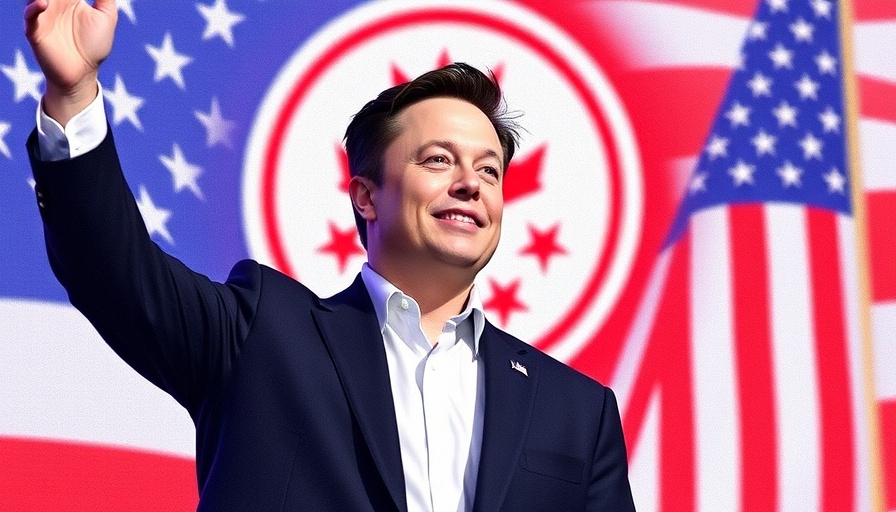
The Fallout of Trump and Musk’s Fractured Alliance
President Trump’s recent outbursts against Elon Musk provide insight into a rapidly deteriorating relationship, once marked by mutual admiration. The crux of the tension revolves around Musk’s announcement of the “America Party,” a third political party he claims is a response to the latest reconciliation package that he opposes. In his criticisms, Trump denigrates Musk's political ambitions as a “TRAIN WRECK,” waving away the possibility of meaningful third-party success in the U.S. political landscape.
Unpacking Political Third Parties in the U.S.
Trump's assertion that third parties inevitably lead to “disruption and chaos” echoes a historical trend in American politics where third-party candidates struggle to gain traction against the established two-party system. Political scientists note that while movements like the Tea Party or Ross Perot's Reform Party briefly captured attention, they ultimately failed to create enduring platforms or substantial electoral success. Trump's argument highlights skepticism about Musk’s new endeavor, suggesting that political fragmentation could pave the way for outcomes contrary to the intentions of change-seeking voters.
Musk's Motivations: Discontent and Disruption
Elon Musk's formation of the America Party arises amidst discord over perceived governmental overreach and economic policies, particularly those affecting the electric vehicle sector, which he champions. Critics, however, question whether Musk’s commercial interests are influencing his political maneuvers, especially regarding the recently passed megabill that curtails EV incentives. By launching a political party, Musk positions himself not merely as an entrepreneur but as a voice for those disillusioned with the traditional political structure—a bold venture steeped in controversy and uncertainty.
Public Reaction: A Mixed Bag
The public's reception of this latest political feud has been varied, reflecting the polarized nature of contemporary politics. Supporters of Trump see Musk's actions as futile and indicative of overreach, while many of Musk's followers express enthusiasm over the potential for a new political avenue that addresses their frustrations. As commentary and memes proliferate across social media, the narrative extends beyond political discussions to dissect the personalities involved. Observers draw parallels between Musk’s bold initiatives in technology and his controversial stride into politics, seeing them as extensions of a singular vision for innovation and disruption.
Parsing the Broader Implications
The disagreement between Musk and Trump raises questions about the stability of coalitions that once seemed rock-solid. Given Musk's immense influence in the technology sector and Trump’s stronghold in Republican politics, where this friction leads could have substantial repercussions for both men. Politically, there is speculation that Musk's party might siphon votes from mainstream candidates, fundamentally altering the dynamics of future elections.
Historical Context: The Third Party Dilemma
The conversation surrounding the efficacy of third parties in the U.S. isn’t new. Historical failures—like the Whig Party's demise or the Greens' limited influence—underscore the daunting task of gaining political foothold in a highly partisan environment. While some believe third parties can inject vitality into stale political discourse, others argue their impact largely results in the splitting of votes and aiding opponents.
Clarifying Misconceptions about American Politics
One common myth about third parties is that they flourish in times of political disenchantment. While it is true that dissatisfaction often breeds attempts at alternatives, the reality remains that these movements frequently struggle for legitimacy. Trump's rhetoric, albeit pointed, captures this broader skepticism and raises concerns that Musk’s initiatives could inadvertently contribute to political fragmentation at a time when unification among ideologies is most needed.
Looking Ahead: Will Musk's America Party Gain Traction?
As stakeholders in the political and economic arenas observe Musk’s next steps, one burning question remains: Will Musk’s America Party gain enough momentum to reshape the political landscape? Or will it fade into the annals of political footnotes, much like its predecessors? The unfolding dynamic will be crucial to watch, with implications reaching far beyond individual interests, affecting the country's political fabric and perhaps our future voting habits.
In a political climate rife with change, both Musk and Trump represent larger narratives—of innovation versus tradition, disruption versus stability. The contours of their conflict, albeit personal, embody the core of a national conversation on what is next for American democracy as it evolves amidst rapid transformations in technology, economy, and public sentiment.
 Add Row
Add Row  Add
Add 




 Add Row
Add Row  Add
Add 

Write A Comment